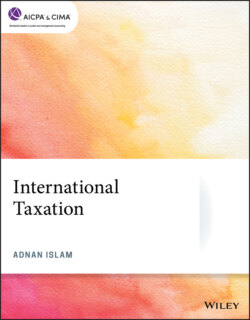Читать книгу International Taxation - Adnan Islam - Страница 6
Summary
ОглавлениеThis course will cover the fundamentals of U.S. corporate international taxation, with a primary focus on “outbound concepts” and technical tax issues. This course has been updated to cover the fundamental international tax provisions within the TCJA, including for international tax Treasury Regulations and Notices released through March 2019.
In general, the United States taxes U.S. persons on their worldwide income. The United States may grant the functional equivalent of an exclusion through a foreign tax credit or tax deduction. For example, under Section 936, a domestic corporation may offset hypothetical U.S. taxes on certain income connected with U.S. possessions against U.S. taxes that otherwise would be due.
Section 7701(b) contains methodical rules to define when an alien is a U.S. resident. Mere presence in the United States for 183 days in a taxable year may subject an alien to taxation on worldwide income for that year. In general, a domestic corporation, which is subject to U.S. taxation on worldwide income, is a corporation incorporated in the United States. In certain narrow cases, however, the Internal Revenue Code (IRC) may treat a foreign corporation as domestic or treat a branch of a domestic corporation as foreign.
In general, a U.S. person that incurs foreign losses may deduct those losses for U.S. tax purposes. However, the deduction of a dual consolidated loss may be limited. Further, recapture rules may trigger income in a taxable year after a foreign loss.
Because the United States generally taxes U.S. citizens and residents on worldwide income, the issue of double taxation may arise when such a person has income from foreign countries or U.S. possessions. To reduce the problem, the United States generally grants a foreign tax credit for income taxes paid to foreign countries and U.S. possessions. Section 904 contains complex rules regarding the foreign tax credit, and its limitations may severely limit the actual use of the credits.
The United States does not automatically tax a U.S. person on the income of a foreign corporation that is owned in whole or in part by that person. Therefore, U.S. persons may form a foreign corporation to conduct foreign activities without incurring U.S. taxes before receipt of distributions from the corporation or a sale of the corporation’s stock. However, Congress and the U.S. Treasury have adopted rules, regulations, notices, and significant annual reporting requirements for controlled foreign corporations (CFCs) and passive foreign investment companies (PFICs), in addition to foreign disregarded entities, foreign branches, or qualified branch units (QBUs), and foreign partnerships.
The United States has entered into tax treaties and conventions with many foreign countries. In general, those treaties affect the U.S. taxation of foreign persons, not U.S. persons. The “Saving Clause” in each treaty generally gives the United States the right to tax its corporations, citizens, and residents as if the treaty had never come into force. In certain cases, a tax treaty may limit the U.S. taxation of U.S. persons. Examples of such help for U.S. citizens and residents include (a) the allowance of U.S. foreign tax credits, with special source rules for purposes of Section 904; (b) tax treaty or protocol clauses that prevent discriminatory treatment of foreign persons that are U.S. residents and of domestic corporations owned by foreign persons; (c) exemptions for certain types of income; (d) the allowance of certain deductions; and (e) the use of competent authority procedures (for example, mutual agreement procedures or “MAP”) to resolve inconsistent treatment by the United States and the foreign treaty country.
